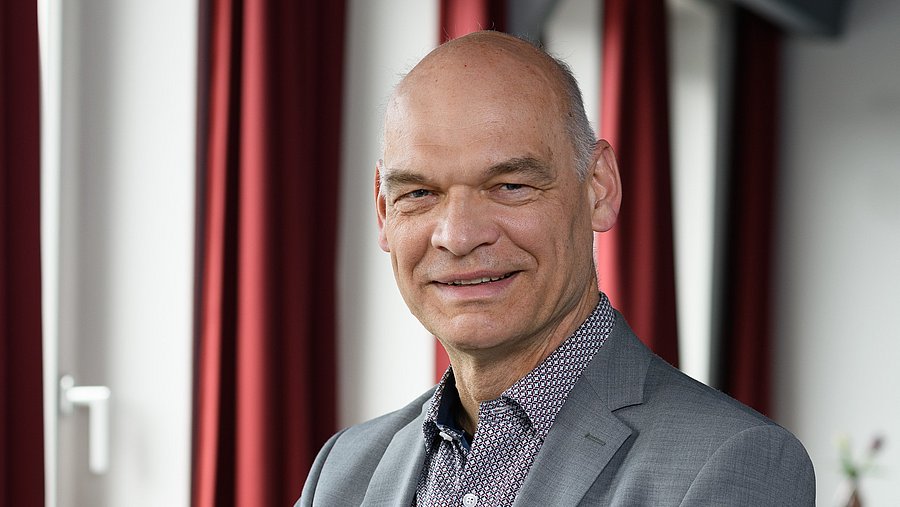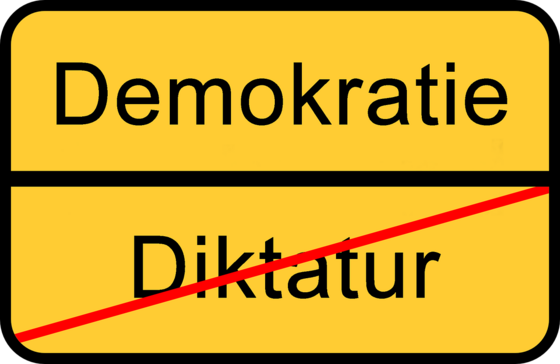
Strengths and weaknesses of democracy
Prof. Dr Detlef Sack / Political Science
Photo: Mathias Kehren
Rule needs people
Political scientist Detlef Sack on the strengths and weaknesses of democracy
Is democracy at an end? Although it is only since the Second World War that most representatives of the elite have come to realise that the common people must be involved in state policy decisions, and since then practically all governments have seen themselves as representatives of the people, more and more democracies are drifting towards autocracies. Professor Detlef Sack, a political scientist at the University of Wuppertal, explains that this phenomenon occurs is because there are different political elites who enter into alliances with different parts of the population. "You can see this phenomenon very clearly in the examples of Putin, Trump, Duterte, and Bolsonaro," he continues. "Basically, we are talking about elites who are not part of the establishment of the old democratic elite, who are relatively strong economically, but who have culturally distanced themselves from the previous elites. And they, in turn - this is part of populism, part of fake news and also part of social media - are forming an alliance with those sections of society that are themselves economically and culturally insecure or are doing badly, but who also see their previous privileges under threat. They are actually culturally dissatisfied politically and tend to be more masculine and in favour of the majority."
This elite is, so to speak, reviving the old idea that the people are too simple-minded and therefore cannot be involved in state policy decisions. They utilise the apparent inability of insecure citizens to make decisions and to govern in order to push through autocratic policies, says the expert. "Victor Orbán would be a modern example." ButHowever, this idea is not that new, explains Professor Sack. If you want to look at how the difference between populations was conceived, you can already find it in the Enlightenment. The journalist Georg Forster wrote about his journey from Düsseldorf to Cologne in 1790 in the book 'Ansichten vom Niederrhein' (Views of the Lower Rhine). In it, he describes the city on the left bank of the Rhine as an enlightened, pure place, while in his opinion the city on the right bank of the Rhine was dominated by the Catholic rabble and plebs. Even then, people had these different ideas of 'the people'.
70% of the world's population live in autocracies
Formally, the number of democratic states worldwide has increased, but in practice, many are turning into secret autocracies, as a study by the Bertelsmann Foundation found. "Political science has certain criteria for systems of rule," says the expert, "and it can be said that almost 70% of the world's population now live in autocratic regimes. that are autocratic. That is a clear change." One of the reasons for this is that established democracies also have certain weaknesses. "These include the lack of representation of the population in parliaments. They include the fact that political responsibility is increasingly being handed over to transnational, supranational institutions. The European Union is a very good example of this." For example, questions about the climate protection agreement are handed over to the Intergovernmental Panel on Climate Change (IPCC), which then has the power of interpretation, so that the issue is removed from democracy. "The population can no longer have a say in this!" This changes the bodies in the transnational arena, but means a negative trend, whereby political responsibility is no longer visible. The argument that everything is so complex does not help anyone at this point and is also not democratic.
In addition to these two weaknesses, the aforementioned split among the elite, some of whom are no longer prepared to govern with democracies, makes things even more difficult. Why? "Democracy has not been able to fulfil certain promises."
According to Sack, this is due to double standards. "The classic example is, of course, military interventions by Germany and the USA in regions of the world where they really have no business. They demand peaceful behaviour from the people there while they move in with the military," he explains and continues: "The next double standard would then be the question of how much social injustice I allow myself in a political system and uphold the standard of social justice, which I can only partially fulfil in my own country." This is also about expectations that have developed in a democratisation process. "If we had come out of a phase of autocratisation, we would not have the expectation that social inequality would prevail here, then we would accept that there are rich and poor people." This can be seen very clearly in the Russian autocracy, where there is a different attitude, expectation and also acceptance of social inequality. "Democracies have raised expectations, and they cannot fully fulfil these expectations."

The right to demonstrate is an important fundamental right
Photo: public domain
Rule needs a population
Democracies have demonstrably failed time and againrepeatedly throughout history. Athenian democracy, democracy in the Roman Empire or the Weimar Republic in modern times. And yYet democracies are always role models for forms of government. "Obviously, there are always regions in which there are political developments that aim to give the population a greater say. The form of democracy is one that reacts at different times in different regions to the fact that rule requires population." Conversely, however, this democracy also means that the population wants a say., and that is the In this constellation, in which something happens. Patterns for this can be found again and again in history. The example of warfare in ancient Athens makes it clear that rule needs the people in order to be able to act. And Furthermore, the economy also needs democratic structures. Sack adds: "At a certain point, democratisation occurs because the economy is dependent on having a qualified workforce. And bBecause it is dependent on thisof this dependence, it must also enable this labour force, i.e. a well-educated middle class, to have a political say, because otherwise they will leave. The constellation is that weWe have an the elite that is dependent ondepends on a qualified population, qualified in the technological, economic or military sense., and conversely t As a counter, this population also says that it wants to have a say in politics,." Sack adds.
Beware of historical equivalences
In 1933, the Weimar Republic ended in National Socialism. The people wanted a leader and got one. The Germans never wanted that again after the Second World War. Today, the AfD, a right-wing populist and far-right political party in Germany, is doing better than the mainstream parties with an approval rating of just under 20%. AndMoreover, in the Bundestag, the opposition is once again demanding a stronger 'leadership role' from the Federal Chancellor.
"That leadership role is certainly questionable," says the political scientist, "but I would always caution against historical equations. I would describe the constellation for the 1932 - 1933 phase differently. It was certainly a time in which the Weimar Republic ran into roughheaded for troubled waters, but it was not a time in which the NSDAP Nazi Party had 50 per cent plus X. In other words, it was a time in which they had a relative majority in government and in which - and this is crucial - the conservatives also transferred power. It was not a seizure of power, but it was, technically speaking, a transfer of power. The Reich President at the time had decided to make Hitler Reich Chancellor, despite criticising him and his entourage." The situation is decidedly different for the Federal Republic. "There are parts of the population that are very, very dissatisfied politically. That'sThat is just the way it is. There are long-term and short-term reasons. The long-term reasons lie in the different political experiences in East and West Germany .and T that is still the case. The difference in satisfaction with democracy as a form of government is a socialisation effect that you can't get out overeliminate within two generations." There are also short-term problems that have rapidly changed the geopolitical situation. "We have a war of aggression in our immediate neighbourhood, we have a complete reassessment of China's role as a major market and we have had the experience of a US administration under Trump, which is now back, but which is likely to change the geopolitical situation to the detriment of Europe and Germany, so to speak. And then we have a government that consists of three coalition partners with programmatic differences that are not easy to communicate." In addition, one coalition partner has suffered political defeats in state elections and is now desperately fighting for survival. "None of this is a good situation, but it's not a power grab or transfer of power situation." There could always be political constellations in certain federal states where the AfD is somehow tolerated or enters the coalition. It becomes problematic in the federal states if the AfD has a say in the areas of police and education, so to speak. "That This situation may be problematic for the individual federal state, but it is notdoes not reflect the situation for Germany as a whole."
Democratic understanding even in a protected space
For the expert, the recent Russian wiretapping incident involving the Taurus cruise missile also shows that democracy is practised in Germany. "If you look at the current Taurus debate, we have a situation where the military is discussing how it could use a certain weapon. It is regrettable that it was intercepted, but it has to be said that the military behaved democratically, that there is a basic understanding in a seemingly protected space. We don'tdo not find arguments that we know from Latin American military dictatorships, that we know historically from the Weimar Republic, that the military itself is a stranger to democracy and is to a certain extent part of the coup problem. The debate is much more about what a weapon system can and cannot do. This was a debate, unless I'veI have completely misheard, about a military deployment by a democracy within a democratically minded leadership. In the Weimar Republic, we had a completely different situation, where the military, police and economy were completely against democracy."

Democracy - Dictatorship
Photo: Pixabay
Democracy can survive resist crises
History has repeatedly shown that after a few years of prosperity, dissatisfaction grows in society, which then at some point throws the entire system into chaos, kills people, destroys infrastructure, in other words destroys everything that a society has built up and then creates something new from the ruins. Professor Sack counters this catastrophic scenario.: "I would rather say that the history of the Federal Republic of Germany is a good example of how things don't always have to turn out like this. After the Second World War, there were thirty very good years, so to speak, in which a non-democratic population democratised itself through a combination of economic growth and the relative stability of the political system,." he says. This peaceful period was not an achievement to be taken for granted. The democratic attitudes of the population only developed in the 1960s. Democracy then had to deal with Aa series of crises were then also dealt with through democracy. "There was 9/11, with considerable restrictions on fundamental rights by the security authorities. Nevertheless, democratic structures were maintained. None of this is seamless and free of criticism, but it remains within a political system." The dramatic economic, financial, and fiscal crisis between 2008 and 2013 was also dealt with through democracy. Sack cites the example of Spain. "One of the core socialisation experiences of young people there was that they had to move back home, that 60 - 70 percent of young people under 24 were unable to find work, which was very dramatic. And where does Spain stand today? Spain is still in a debate about the democratic form of government, although right-wing populist movements, the Vox, have emergedappeared relatively late in the gameon the scene compared to the rest of Europe. So, for me the picture that emerges for me is that democracy has so far been quite capable of dealing with certain problems of a geopolitical and economic nature." The crisis-like nature of a political system is also due to the inherent dynamics of the economic system in which we live, which is crisis-like in itself.
Room for pessimism and optimism
'We learn from history that we do not learn nothing at allfrom history', said the German philosopher Georg Wilhelm Friedrich Hegel. "Of course, it's always difficult to disagree with Hegel," laughs Sack, "but I wouldn't agree, because it depends on what idea of history we have." Sack sees a permanent learning process in technological development, rather than in capitalist development. But itIt is nevertheless exciting to observe whether it exists within the framework of political forms of rule in different regions. "I believe that every region has always learnt something different, and there are various developments, i.e. there is room for pessimism but also for optimism, both are possible. It also depends to a certain extent on how citizens take this quote from Hegel. So whether If they say that nothing has been learnt from history, citizens automatically put think themselves that they are in a situation of where 'there's nothing you can do anyway'. But However, if citizens are active and want to shape things, then they say, "well, I don't know if it's as big as Hegel says, but I do know that there is such a thing as active, positive development that I can make a difference to myself."
Uwe Blass
Dr Detlef Sack is a professor of Ppolitical Ssciences, in particular democratic theory and government systems research at the University of Wuppertal.
